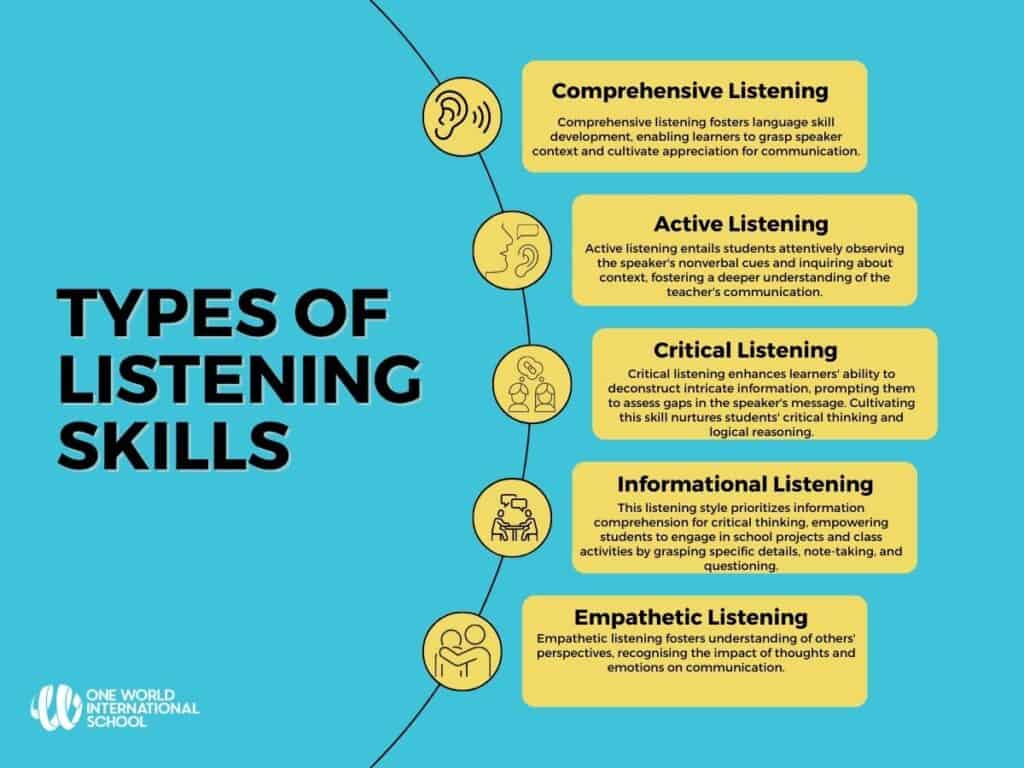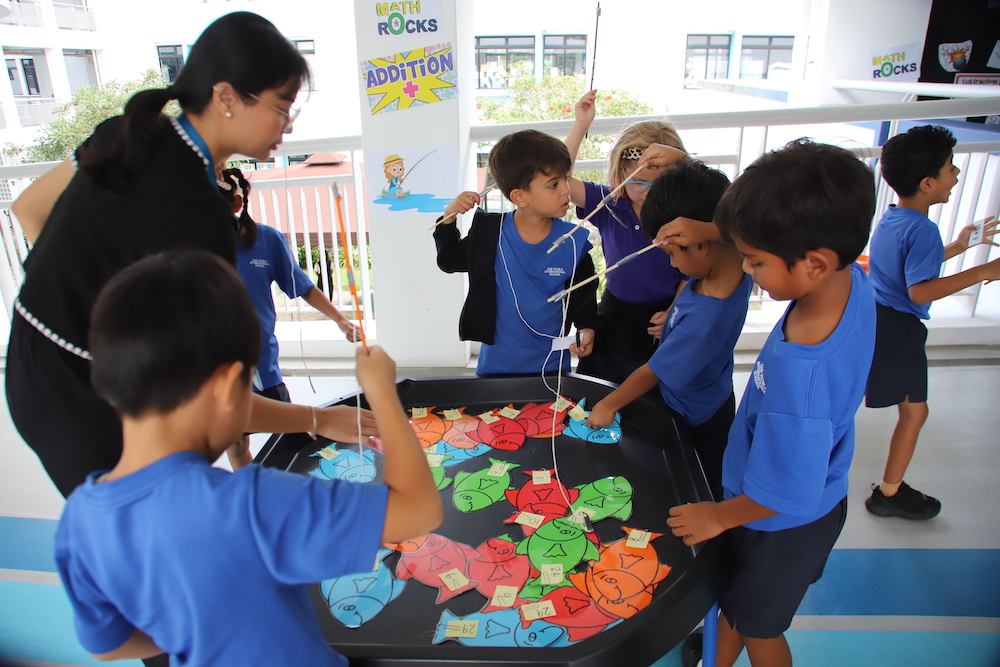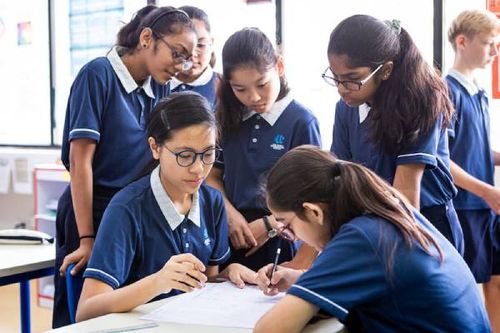Listening skills fundamentally help young students to comprehend and incorporate the knowledge they gain in school. These skills also make them better communicators and give them more confidence to make their own decisions.
Educators at One World International School help students to develop their listening skills by providing the right tools, resources, and support. However, it is essential to remember that everyone has different learning styles and strengths, and improving these skills takes time and effort.
Types of Listening Skills
Here is an overview of the types of listening skills students can be encouraged to develop in school:

Benefits of Developing Good Listening Skills
- Good listening skills help improve communication in the classroom with the teacher as well as classmates. Effective communication also helps build language skills that enable children to actively engage with others.
- Children strengthen their relationships at home and school when they become more empathetic. They learn how to effectively ask questions to understand what the other person is going through and how to act on the feedback. In addition, they identify ways to communicate their needs to parents and teachers when they are facing any challenges.
- Increasing sound awareness enables the differentiation of tones and inflections to isolate individual sounds when a person speaks. For example, through sound awareness, children are able to tell if someone is angry or happy from their tone.
- Listening well can improve classroom performance since learners pay full attention to teachers and class activities. Through effective listening, they follow instructions and get the confidence to ask questions when needed.
- By paying careful attention to what others in the classroom are saying, misunderstandings are reduced. Students become more capable of comprehending complex information, and they participate actively in conversations.
- Students who listen well are more comfortable participating in class, at home, and in other social settings. This confidence prepares them to succeed in all areas of life.

Five Strategies Followed by OWIS Teachers to Improve Students’ Listening Skills
Our experienced educators at OWIS adopt different strategies to improve a child’s listening skills and help them to succeed in their learning goals.
Every teacher has a way of drawing children’s attention when they are distracted. Whether it is through “Eyes on me” or through rhythmic clapping, our educators adopt their own “attention-getters” to get students to pay heed to their next task or activity.
Here are some other ways through which our teachers at OWIS develop listening skills –
- Narrating Stories
Narrating stories is a fun and engaging activity that helps to build listening skills in children. When children listen to a story, they are encouraged to pay close attention to the details, understand the sequence of events, and connect it to their own experiences. Teachers can ask questions to confirm if the child is attentive. This helps develop their listening skills, as well as their comprehension and critical thinking abilities. By incorporating activities like story-telling, we provide children with a rich interactive learning experience that encourages them to engage and develop their listening skills.
- Holding Conversations
Teachers hold conversations with students to help them with their listening. For example, by asking them about their weekend, teachers can share some stories from their end to encourage listening. Dialogue works better since a child pays more attention to activities that pique their curiosity.
Furthermore, this type of interaction helps students build confidence in their listening skills and feel more comfortable participating in group discussions and other communication-based activities. It contributes to better learning throughout primary and secondary education. At OWIS, teachers always provoke and prompt young learners to foster open-ended discussions, where learners generate their own ideas on certain things. They create a supportive environment that helps children develop their listening skills and become effective communicators.
- Engaging In Fun, Hands-on Activities
Engaging in hands-on, inquiry-based activities with instructions helps a child to listen and understand what to do. These activities capture a child’s attention and promote active listening. OWIS Nanyang is a leading IB School in Singapore, and our teachers encourage all the children in their classrooms to engage in their inquiry-led learning experiences.
There are other fun activities that take place in OWIS classrooms that nurture listening skills, such as games that involve following instructions, storytelling sessions, and musical performances. These activities also foster a love of learning and provide children with a fun and relaxed environment to practise their listening skills. OWIS’s play-based learning encourages this, and our young learners in Early Childhood get to learn and engage with their peers at the same time.
- Leading by Example

Teachers and staff at OWIS actively listen to the students and model good listening behaviour. This includes eye contact, paying attention when the child speaks, avoiding distractions, and responding appropriately. By setting a good example, students are more likely to adopt these behaviours and become more effective listeners. Teachers can engage students in discussions and activities that require active listening, such as group work, projects, and storytelling. Through these experiences, students practise and refine their listening skills in a supportive environment.
- Involving them In Decision Making
Allowing children to contribute to decisions and express their opinions makes them listen carefully to what others are saying. It helps them to build confidence and a sense of independence. In a school setting, this can be achieved by involving students in class discussions, group projects, and decision-making activities. By making them feel valued and heard, children are more likely to engage with others and improve their listening skills. At OWIS, our classroom agreements are created by students by collaborating with and listening to one another and the teacher.
7 Listening Activities for Children
As children grow up, improving their listening skills plays a huge role in building life skills. Although parents may find it hard to help children listen, there are a few games and activities to help. These activities teach them to follow instructions and value other people’s ideas.
- Giving Instructions
Cooking at home is perfect for giving children instructions. Read out instructions and ask them to repeat them out loud. As they repeat the instruction, watch their actions to determine if they understand the message. (However, be careful in letting children work with kitchen appliances and sharp kitchen objects.)
- Asking Questions
When reading stories to children, ask them questions to engage them at all times. For example, ask about their opinions, favourite characters and what they like about the story. Asking questions encourages them to hold conversations by understanding differing opinions. In addition, the way they answer these questions also gauges their comprehensive listening skills by how they process information.
- Playing Listening Games
‘Simon says’ is an excellent game for developing comprehensive listening skills. It gives a child instructions on what to do, making them more attentive. Parents can create listening games that connect the child with their environment for better interaction. These games could revolve around identifying objects in the house or park.
- Playing Story Chain
A story chain is an engaging activity that children play with friends or family. A group or family member will start a storyline, and the child will add lines to build the story. With each person contributing to a story, they explore their creativity in a fun way. Through this process, they also understand the story’s context without breaking the flow.
- Reading Aloud
When reading stories to children, it is advisable to read out loud to build their listening skills. Reading aloud improves their sound awareness by learning about the tone of voice. It will also improve their pronunciation.
- Playing Odd One Out
This game is more complex, which makes it ideal for understanding complex information. It teaches children how to isolate specific information in a sequence of words. When reading sentences, insert a word that does not fit the context. Ask them to identify the odd one out and give award points for each correct answer. For example, reading a list of colours, then mentioning a fruit and asking them to pick the wrongly placed word.
One World International School (OWIS) implements various strategies and techniques to develop and improve listening skills from Early Childhood to Secondary School. Through play-based learning in Early Childhood and inquiry-based learning in Primary School and Secondary School students interact with various aspects of language, learn to appreciate what others say, and respond accordingly.
To find out more, please contact our Admissions Counsellor.















